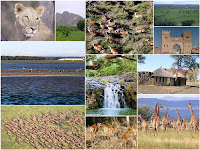Join the Climate Express
In the next few days, World leaders will decide on how to control the effects of Climate Change. Many countries will be at Copenhagen for the meeting, but only a handful of rich, powerful countries' decision will matter. For the poor nations, like those in Africa - although they have the least adverse effect on the climate and are the most affected by Climate Change, they will have the least say at the conference. And for Africa, Climate Change could be the greatest danger we are now facing. It could be a matter of our survival. What happens in Copenhagen matters. Matters most to Africa.
Africa accounts for just less than five percent of global greenhouse emissions, but the continent suffers the most. In the the last few months, millions of people have lost crops, livestock and even their lives through drought that have swept through Kenya; in the last few days, in Kenya, diarrhea, an indirect result of the drought and then the heavy rains, has already killed several people. From prolonged droughts to melting ice caps to heavy flooding and unpredictable weather patterns, climate change effects are already wrecking lives in Africa, the continent that pollutes the least.
If global warming continues and temperature rises by just 1.5º Celcius - the cost for Africa, each year, will be catastrophic and in billions of Dollars; millions more in the Continent will be suffering from hunger, diseases, floods and water shortages. There will be millions of malnourished, dying children. The number of people suffering from malaria and diarrhea, will increase dramatically.
Most of us simple individuals and citizens of the World are not able to join the Climate Express to Denmark; but there are a few things each of us can do to help. With small actions here and there, every day - each of us can make an enormous difference. Here are a few things you can do:
Support Wangari Mathaai and Greenbelt Movement.
Support Greenpeace.
Be informed: here, here, here, here and here.
Africa accounts for just less than five percent of global greenhouse emissions, but the continent suffers the most. In the the last few months, millions of people have lost crops, livestock and even their lives through drought that have swept through Kenya; in the last few days, in Kenya, diarrhea, an indirect result of the drought and then the heavy rains, has already killed several people. From prolonged droughts to melting ice caps to heavy flooding and unpredictable weather patterns, climate change effects are already wrecking lives in Africa, the continent that pollutes the least.
If global warming continues and temperature rises by just 1.5º Celcius - the cost for Africa, each year, will be catastrophic and in billions of Dollars; millions more in the Continent will be suffering from hunger, diseases, floods and water shortages. There will be millions of malnourished, dying children. The number of people suffering from malaria and diarrhea, will increase dramatically.
Most of us simple individuals and citizens of the World are not able to join the Climate Express to Denmark; but there are a few things each of us can do to help. With small actions here and there, every day - each of us can make an enormous difference. Here are a few things you can do:
- Change a light. Replacing a regular light bulb with a compact fluorescent one saves 150 pounds of carbon dioxide each year.
- Drive less. Walk, bike, carpool, take mass transit, and/or trip chain. All of these things can help reduce gas consumption and one pound of carbon dioxide for each mile you do not drive.
- Recycle more and buy recycled. Save up to 2,400 pounds of carbon dioxide each year just by recycling half of your household waste. By recycling and buying products with recycled content you also save energy, resources and landfill space!
- Check your tires. Properly inflated tires mean good gas mileage. For each gallon of gas saved, 20 pounds of carbon dioxide are also never produced.
- Use less hot water. It takes a lot of energy to heat water. Reducing the amount used means big savings in not only your energy bills, but also in carbon dioxide emissions. Using cold water for your wash saves 500 pounds of carbon dioxide a year, and using a low flow shower-head reduces 350 pounds of carbon dioxide. Make the most of your hot water by insulating your tank and keeping the temperature at or below 120.
- Avoid products with a lot of packaging. Preventing waste from being created in the first place means that there is less energy wasted and fewer resources consumed. When you purchase products with the least amount of packaging, not only do you save money, but you also help the environment! Reducing your garbage by 10% reduces carbon dioxide emissions by 1,200 pounds.
- Adjust your thermostat. Keeping your thermostat at 68 degrees in winter and 78 degrees in summer not only helps with your energy bills, but it can reduce carbon dioxide emissions as well. No matter where you set your dial, two degrees cooler in the winter or warmer in the summer can mean a reduction of 2,000 pounds of carbon dioxide a year.
- Plant a tree. A single tree can absorb one ton of carbon dioxide over its lifetime.
- Turn off electronic devices when not in use. Simply turning off your TV, VCR, computer and other electronic devices can save each household thousand of pounds of carbon dioxide each year.
Support Wangari Mathaai and Greenbelt Movement.
Support Greenpeace.
Be informed: here, here, here, here and here.


